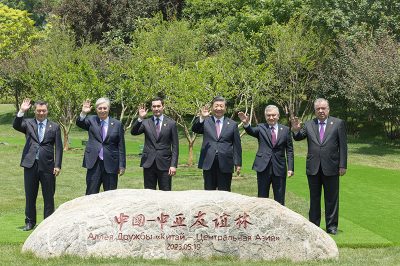Over the past three decades, China and Central Asian countries have developed a robust and mutually beneficial trade relationship. China has emerged as the most significant trading partner for Central Asian nations, while Central Asia provides China with valuable resources and market opportunities.
The recent China-Central Asia Summit in Xi’an further solidified the bonds between these regions, focusing on enhancing regional cooperation, trade, investments, and security. This article examines the critical highlights of China’s engagement with Central Asian countries and the implications for their bilateral relations.
China’s trade with Central Asian countries has witnessed remarkable growth, with bilateral trade reaching a record high of US$70.2 billion in 2022, representing a substantial 40 percent increase. While Central Asia currently accounts for only a fraction of China’s total imports and exports, the untapped potential for further development and diversification is evident. As China seeks new trading partners amid changing global dynamics, Central Asia presents a lucrative opportunity, particularly in agriculture and raw material exports. This flourishing economic cooperation has bolstered regional stability and fostered shared prosperity.
Chinese investments in Central Asia have played a pivotal role in strengthening economic ties. With assets exceeding US$15 billion, China has focused on crucial sectors such as geological exploration, oil and gas production, digital technologies, and transportation infrastructure. The BRI, a flagship initiative for regional connectivity, has facilitated infrastructure development, including the China-Kyrgyzstan-Uzbekistan railway line and improved road networks. These projects have enhanced trade facilitation and accelerated economic growth and integration, bringing prosperity to both China and Central Asian nations.
The recent announcement of a visa-free agreement between China and Kazakhstan marks a significant milestone in promoting people-to-people exchanges and fostering closer ties. This agreement allows citizens from both countries to stay without a visa for up to 30 days, encouraging cultural understanding and facilitating business interactions. Moreover, discussions on constructing a new railway and a gas pipeline branch involving Uzbekistan and Tajikistan underscore the commitment to enhance regional connectivity. These infrastructure projects hold the potential to stimulate trade, attract investments, and promote sustainable development across the region.
China’s active pursuit of defense cooperation with Central Asian countries, particularly Tajikistan, demonstrates its commitment to regional security and stability. The modernization of border posts along the Tajik-Afghan border and joint military exercises showcase China’s determination to safeguard its borders and support its neighbors in combating terrorism. Other Central Asian countries have also engaged in defense collaboration, fostering an environment of trust and cooperation. Such partnerships are crucial in maintaining peace and security in the region, benefiting both China and Central Asia.
Also Read: China-Central Asia Summit enhances economic cooperation
China’s efforts to promote educational and cultural exchanges have profoundly impacted China-Central Asia relations. The establishment of Confucius Institutes and grants for higher education in China has facilitated learning Chinese language and culture in Central Asian countries. These initiatives have enriched the educational landscape and fostered mutual understanding and goodwill between the peoples of China and Central Asia. Such people-to-people exchanges lay a solid foundation for long-term cooperation and friendship.
The strengthening relationship between China and Central Asian countries presents a win-win situation for all parties involved. The exponential growth in trade, strategic investments, and infrastructure development has created a conducive environment for shared economic prosperity. The China-Central Asia Summit in Xi’an has reinforced the commitment to deepen regional cooperation, enhance connectivity, and address common challenges. As China continues to seek new partnerships in an evolving global landscape, Central Asia’s strategic location, resources, and untapped potential make it an indispensable ally for China’s sustained growth and regional stability. China and Central Asian countries are poised to shape a brighter future through mutual cooperation and collaboration.
International Relations Scholar interested in National Security strategies, with a good focus on Geo-Politics, Foreign Policy, and Public & Cultural Diplomacy.








